MEDIA & REVIEWS
SEASON REVIEWS
Use the links below to see reviews for specific seasons of Breaking the Castle.
Radio Interviews with Peter Cook
FEATURED REVIEWS
THE NEW CURRENT
★ ★ ★ ★ ★
31 October 2023
One of the benefits of living in London is knowing that even if you miss Edinburgh Fringe, venues like Pleasance will have a post-festival series, which gives audiences the opportunity to see the wide-ranging theatre that’s on offer at the Fringe. One of the undeniable hits of the 2023 Fringe was Peter Cook’s Breaking The Castle, a one-man play about addiction that is drawn from Cook’s own life and experiences.
Words are fickle when you are trying to describe something like Breaking The Castle. Words become irrelevant as you try to offer something positive and honest to the reader because they should know that the production they might see is not just worthy of their time but that they will feel more inspired by seeing it. Breaking The Castle is a rare production that never lets you go. It doesn’t preach, but it preaches; this becomes its default setting as soon as you forge this connection with “David” that Cook establishes the minute we see him.
David is an addict, and with his acting career nearly failing to launch and personal issues that have started to entrench themselves in his subconscious, David has fallen deeper into his dependency on drugs. A chance meeting with an old, rich friend provides David with a life-changing opportunity: rehab in Thailand. Initially, there is reluctance as David traverses the rules of rehab, the people, their stories, and the importance all this means for him and his life. Caught at somewhat of a crossroads, David, eager to leave, finds himself swayed by one of the rehab nurses and decides to. This decision is ultimately the first step he takes in wanting to save his life, and as layer after layer falls off, it reveals a man who has never taken a moment to look inward and to understand the role trauma has played in his life.
When we first meet David, he’s walking around his old stomping ground. He's sober and has started to see the benefits of his rehab. On meeting an old friend from his addict days, he’s almost drawn back into the time he’s managed to pull himself out of. Talking to his friend, a lost soul who has no chance of being able to smell how fresh and freeing life can be, David wonders if he’s really about to stick to his sobriety. Without judgement and without passing comment, David extricates himself from his old friend, and with a deep, meaningful look in his eyes, he looks back at him and wishes him well.
Breaking The Castle is a play that has many layers to it and offers audiences a genuine insight into addiction and the people it impacts. Writer and performer Peter Cook’s decision to use his own life and experiences uplifts the piece greatly, and audiences will be thankful for it. One of the biggest strengths of the piece lay in Cook’s ability to make “David” so honest and relatable. As we follow David from a drug-filled life to rehab, we grow to understand that there are a million and one reasons why someone finds themselves in a situation like this. It’s also a situation that anyone can find themselves in.
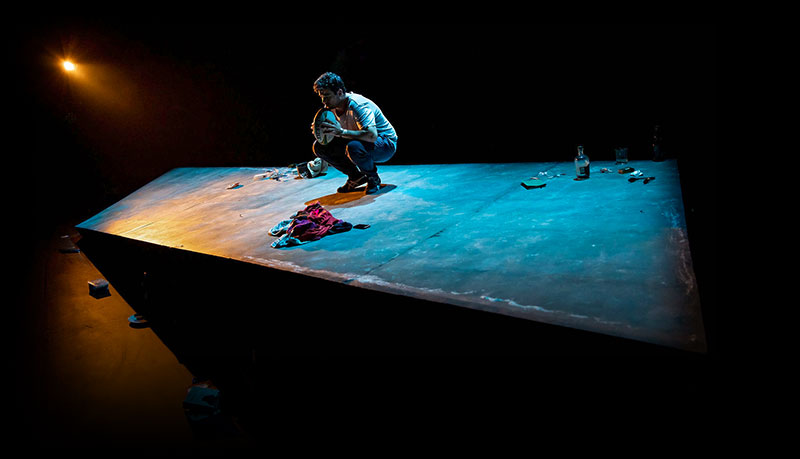
The most beneficial aspect of David’s rehab was discovering how impactful trauma was and is on his life and how this may have had an impact on his dependency on drugs. Through a variety of flashbacks, we get to understand a little more of David’s family life—abusive and distant parents, possible sexual abuse when he was young, unfairly being placed in the shadow of his older, sporty brother, and the illness of his sister. All this seemed to happen at such a young age; how could anyone really come through this unscathed? And with all this he had to contend with, the only real positive he was able to gain was the support he got from a teacher during his debut theatrical production. This scene, like many before it, was played so delicately that one could not fault the power and the impact that it has. All children seek out and search for some form of validation, and for him to get this for his acting, a thing he never thought he would lean into, was profoundly touching.
This early exposure to acting really brilliantly illustrates why acting is so important to him and his life. It is the one consistent thing he’s been able to latch on to, that he’s good at, and the one thing he cannot give up on because to do so would be to give up on his life. It is through a series of flashbacks that the audience becomes more aware of David, his struggles, and the many things that have been placed on him. Interestingly, David talks at length about his sister, someone who was more of a protector of him than I think he ever realised she was, than he does about his older brother. In one of the funnier flashbacks, a young David is clearly visibly disappointed to be constantly compared to his legendary older brother. That doesn’t change the direction the play takes, and it doesn’t impact the narrative slightly. A lot of people, places, and memories fly in and out of David’s stories, but the lack of discourse over his older brother gives the impression there are more, perhaps unresolved, issues between the two of them.
One of the more effective elements of Breaking The Castle is the discussion around drugs, drug culture, and addiction, which is breathtakingly illustrated as David does a show-and-tell featuring his drug of choice, crystal meth. Even now, I can hear the sound the crystal makes as it hits the base of the glass pipe and the clicking sound the light makes. In all the noise, sweat, and movement, David pauses for a moment to tell him what these feelings mean to him, what those sounds mean to him, and how intoxicating they are. And it is this sound of the crystal hitting the bottom of the glass pipe that is repeated briefly in the distance; you hear it again and again as David talks. You feel its power, the grip that it has over him, and how, in an instant, a sound can drag him back into a world he wants to leave.
As a performer, Peter Cook engages you from the moment you meet him on the edge of the stage. The first words he utters offer insight into not only his character but also him as a person and the experiences he’s endured. But, most powerful of all, there is no blame. There is no blame towards his parents, school, or being forced into doing a job for Mortein. There is a positivity within his text and in the nature of how Cook brings David to life that is as life-affirming as it sounds. You’re rooting for David hard, and you see that what he’s having to deal with is not easy and perhaps not even solvable, but you root for him to not slip.
As for David, Cook ensures that we know that David is aware that he’s an addict and that he’s not cured; there is no cure. He’s going to be an addict for the rest of his life, and he’s going to face challenges, flashbacks, and memories that are going to hurt him and place him in a dark place, but he knows he has to maintain the strength that he’s found within himself. He knows that if he can do that, he can continue on this new, clearer path he’s created for himself, one day at a time.
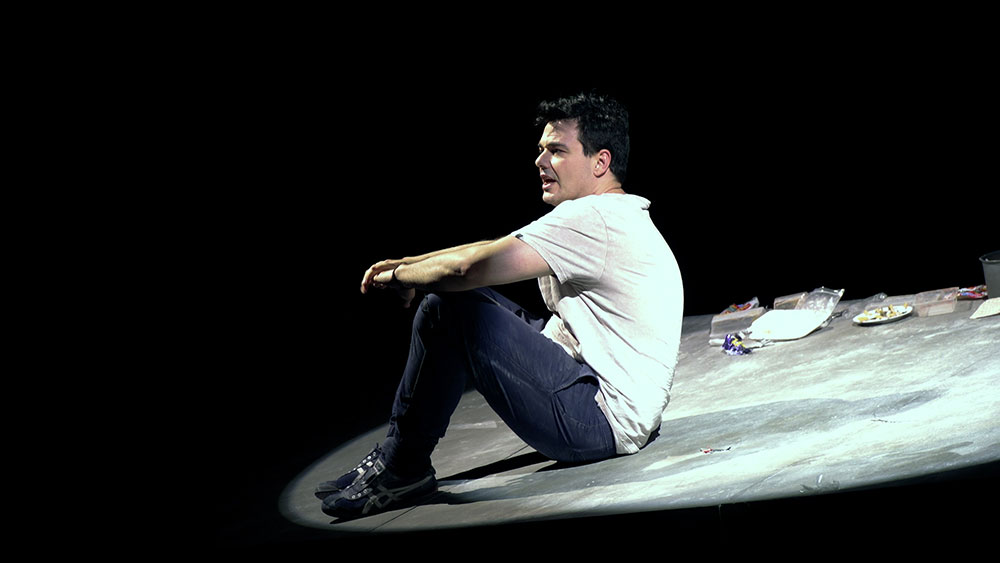
ADVENTURES IN THEATRELAND
★ ★ ★ ★ ★
Oviya Thirumalai | 11 November 2023
Breaking the Castle is a one man show, written and performed by Peter Cook and directed by Bridget Boyle. The show follows David through his recovery at rehab as he overcomes his addiction, whilst also grappling with his unsteady career as an actor and playwright. The show is brilliantly written, weaving past and present together, giving us a better understanding of his traumatic past, and the issues that led him to start drinking.
It's the careful stripping away of his tough exterior to give us a glimpse at his childhood, and a thoughtfully complete revealing of these traumatic events that really help us feel their impact. It's through truly brilliant use of comedy, spoken word and theatre that Peter Cook achieves this. The writing is stunning - mixing hard truths, self-deprecating humour, sensitive reflections and a truly powerful speech at the end of the show.
The show relies heavily on imitations in the first half (Shoutout to vocal coach Linda Nicholls-Gidley) which helps bring to life his world. However whilst entertaining, it does become a little confusing to keep track of a number of nameless characters, and ultimately distracts away from David's core story. There's a sense of the show attempting to be both a serious play and also a piece of stand up comedy, but quickly finds itself. The pivotal turning point of the show comes with a tough love conversation with his therapist, and the show really excels hereafter. The originality of Cook's writing shines throughout but the scenes with his therapist particularly.
The sound design (Kimmo Vennonen) really adds to the piece, taking us through an array of emotions. It's the unsettling use of music and echo to denote David's trapped and frightened childhood self within him, that was particularly incredible. The set is simple (Ieuan Watkins), with David's possessions and clothes strewn about the stage, creating a chaotically messy environment. The use of powder and confetti for cocaine creates some stunning visual moments, but it's the use of the props of a lighter, crystal and holder that has us holding our breaths, intoxicated by Cook's acting in the moment.
Peter Cook, whilst emphasising the lows of being high, also takes us on a rollercoaster journey of the highs of being high. We're given a front row seat to the various states and emotions, and really feel the panic and paranoia that David experiences when he's lost in his own mind. Cook is a one man army, establishing himself as a performer and writer to watch out for. It's the final few moments of the show, where Cook lapses into spoken word which really brings the show together. Selecting key moments, reflections and events, he brings the audience to tears in a passionate and heartfelt speech. Now clean, David uses this speech to move, inspire and remind us of the importance of hope.
Breaking the Castle really does break down the walls and stigma around rehab and recovery (and even addiction). An absolute gem of a show, it becomes a tear-jerker tale of overcoming addition, second chances and not giving up.
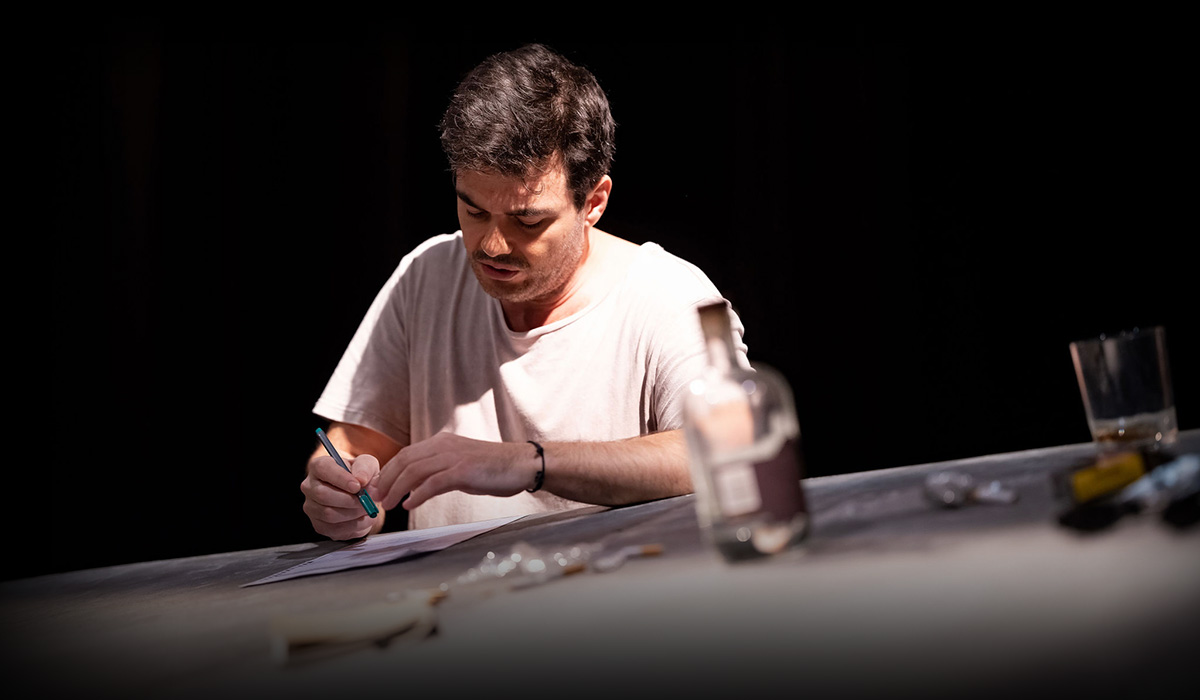
ARTS HUB
★ ★ ★ ★ ★
Suzannah Conway | 1 March 2023
This extraordinary piece of writing is brought vividly to life in a one-man show by and starring Peter Cook.
Breaking the Castle was born following Peter Cook’s attendance at a script development course in Canberra, where he made the decision to write a play based on his own, some would say quite extraordinary, life experiences. He trained as an actor at the Victorian College of the Arts and writing was not foreign to him, as he had developed many scripts elsewhere, but Breaking the Castle was his first main play.
Developed with the support of The Street Theatre, Canberra, which subsequently produced the world premiere in 2020, the production then toured to HotHouse Theatre in Albury/Wodonga in 2021 and to Riverside Theatres in Parramatta in 2022.
This Queensland premiere is a completely new version of Breaking the Castle, with creative input from local sound, lighting and stage designers. It has also been re-visioned with direction by the impressive Leah Purcell, whose company Oombarra Productions, with producer Bain Stewart, is a joint presenter with QPAC of this season’s new production.
The story that Cook tells is not an easy one, dealing as it does with drug addiction and mental illness. He says that he wrote the play because he is one of the few people that made it out alive after hitting rock bottom. Having been given the opportunity for rehabilitation, he now wants to give a voice to those on the fringes of society who do not have that same opportunity. Bravely, he is also keen to face his past demons in this work and take away some of the stigma attached to addiction and mental health.
Cook stars in his one-man show, playing Dave Smith, a character who is based very much on him, but with some obvious theatrical licence. The play is a 90-minute monologue and is extremely well constructed, moving fluidly from one scene to the next on an open set that represents variously: his home, Darlinghurst streets, a Thailand rehabilitation centre, sporting fields, audition rooms, pubs and the TAB, among other locations. It is very well-written, energetic and punchy, with Cook playing not only Dave but a range of other characters who impact on his life in various ways.
These all have their own particular voices and accents, including his friends Johnno, a drug addict, and Frank, a recovering addict. When he first arrives at rehab, he likens it to the United Nations and rattles off a series of first-rate accents from the US, Ireland, Eastern Europe and India, which are sharply identifiable. The counsellor’s Cockney accent, a continuing thread in the story, is also spot on.
The show starts with Dave waiting for his cue to go on stage in an unidentified role and play, but it’s an image he comes back to time and again. One feels that being an actor, and his desire to be on stage, is often what kept Cook, and by default Dave, going through the tough times. Another haunting image is of a huge door revealing light through the cracks, accompanied by reverberated sound, perhaps a dream, perhaps a possible way out of his addiction.
The work is variously sad and poignant, with an often wry and self-deprecating sense of humour.
It can also be hilariously funny, especially a marvellous scene where, as an out-of-work actor he is auditioning to be a cockroach in a Mortein advert, and has to die an agonising death on the floor. A scene in the TAB where he is watching the race as the commentator and encouraging his horse to win is hysterical and brilliantly delivered.
We learn through the rehab scenes, which pepper the story, that the turning point for addicts is to admit you are one. Once that hurdle is passed, then it is possible to have faith in yourself and try and turn your life around, as Dave does. The tough-skinned counsellor is all important here. There is a particularly chilling scene where Dave shows us the process involved in smoking crystal meth and the effect it has on you immediately and over the next three days. If anything could be designed to turn a person off drugs, then this would be it. Additionally, the most poignant episodes are around the death of his older sister from leukaemia, and a scene at six years of age hinting at sexual abuse. These slices of life are tinged with grief and heartache.
Purcell’s direction is exemplary, rhythmically weaving a cohesive path through the various scenes and establishing the character and life of Dave with great aplomb. Cook’s performance is a tour de force, as he skilfully changes direction and moods, presenting the various scenes and characters flawlessly, and thus allowing the work to flow seamlessly. Set design by Raymond Milner, lighting by Ben Hughes and sound by DOBBY are all first-rate.
At the end of the Breaking the Castle, Dave tells us that punishing people for addiction is not the answer, as ‘the hell of addiction is punishment in itself’. It is a sobering reminder of an illness that has afflicted so many in our society and our need to find much better ways to prevent and cureaddiction and aid mental health.
This is not only a very good play, beautifully conceived, written and delivered, but it sends a strong message of hope, as well as a need for better understanding. As Cook so eloquently puts it: ‘I wrote it to humanise people suffering with these issues and encourage a sense of compassion for those who have fallen between the cracks.’
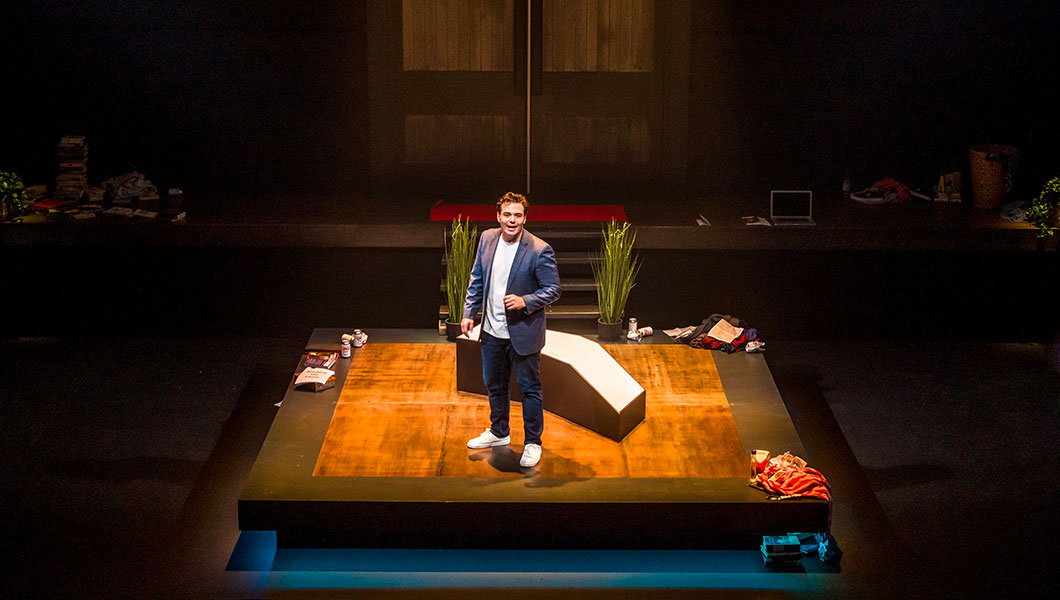
THREE WEEKS – EDINBURGH
★ ★ ★ ★ ★
Andrew Melrose | 15 August 2023
Leaving the theatre, my mind and emotions were in turmoil as I tried to process this remarkable play dealing with addiction. Though it’s hard to watch at times there are glimpses of light, especially at the end, and Peter Cook delivers such a captivating performance that you instantly become attached to and root for him. The lighting, pacing, and acting are cleverly executed, making the message effectively conveyed in a way that’s not in your face. The script is well written, and basing it on real moments gives it the realistic quality that sends this show to the next level. A show that has the power to teach and inspire, as it has profoundly affected me and transformed the way I see others.
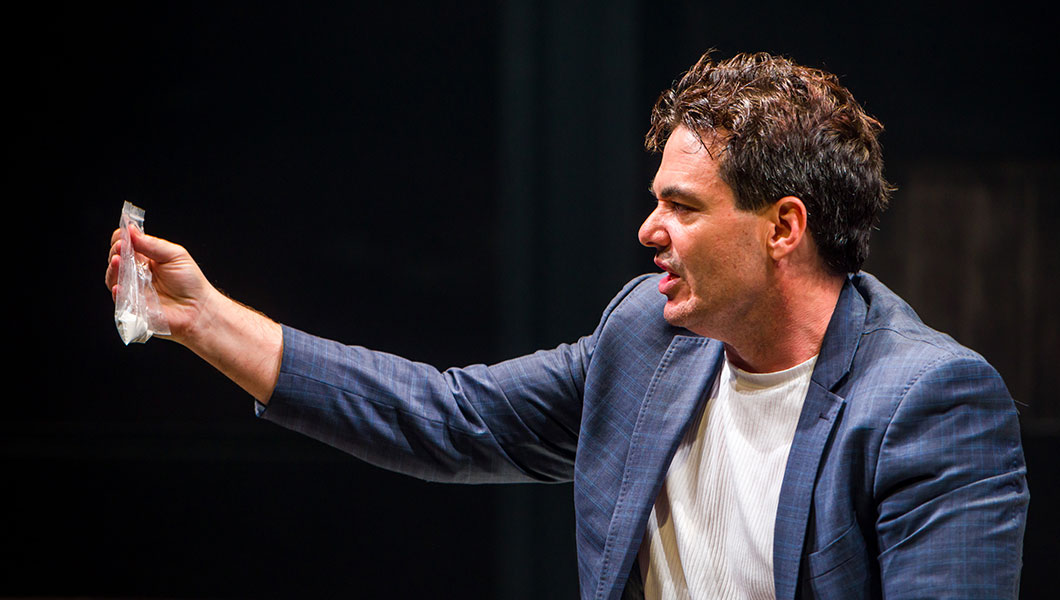
LONDONTHEATRE1
★ ★ ★ ★ ★
Breaking The Castle at Assembly Rooms Edinburgh
Chris Omaweng | 20 August 2023
This story feels like a road well-travelled, but there are plenty of people who fall into drug addiction and mental ill health who aren’t around to tell the tale. There are even fewer who have put pen to paper, or fingers to keyboard, to tell it, and there are fewer still who have travelled to the Edinburgh Fringe all the way from Australia. This show is not, however, a triumphalist endeavour: David Smith (Peter Cook) is not placing judgement on anyone who doesn’t successfully complete rehab, and indeed there were several points in this candid story in which he took positive steps to quit the process and attempt to go his own way.
It’s also one of those shows that has a lot of narrative to squeeze into an hour, and it hits the ground running and – pardon the analogy – David does behave as though he really has taken amphetamines, with an almost mesmerising cacophony of different characters at a rehab session, with distinct personalities and different nationalities. There are times, particularly when David is in protracted conversations with his recovery mentor, but also when friends and relatives try to contact him with increasing concern and alarm (the rehab clinic takes his mobile phone away on checking in, but it appears nobody told him that beforehand) when it is easy to forget that this is a single-performer show.
Based on his own lived experiences, Cook’s play also reveals the reality of a jobbing actor, and he takes whatever work is available (that is, within the boundaries of reason) – one audition was for a Mortein advert. Mortein, for the uninitiated, like me, is an Australian brand of pest and insect control products. Seeing David roll around on the floor pretending to be a dying cockroach exposed to the apparently fast and effective Mortein spray was a moment of sheer hilarity, comic relief (if you will) from the darker elements of the story.
There were other career options available to him, including ones his family would have preferred him to take up, all of which were gloriously pitted against one another in a horse race. David’s commentary is amusing as much as it is riveting. The play both describes and dramatizes what leads up to taking substances, whether smoked or sniffed, its brief high and the long aftereffects. Let’s just say I wasn’t exactly inclined to give crystal meth a go for myself any time soon.
It’s not the first time I’ve come across a group session on stage, or indeed on screen, at a rehab centre: we all know they do that thing where someone admits for the first time, “My name is X, and I’m an alcoholic”, which results in a round of applause. There aren’t many shows, however, that delve into as much detail as this one does about a person’s level of resistance, and seeing David go from outright denial to genuine and sincere acceptance is very moving. He was, at one point, admitted to a secure psychiatric unit, and there was family tragedy as David’s sister dies from acute myeloid leukaemia. That there is still light at the end of the tunnel, and that he finds it, is extraordinary. “I tried dying, and it didn’t work. I might as well try living,” he muses. A powerful and poignant production.
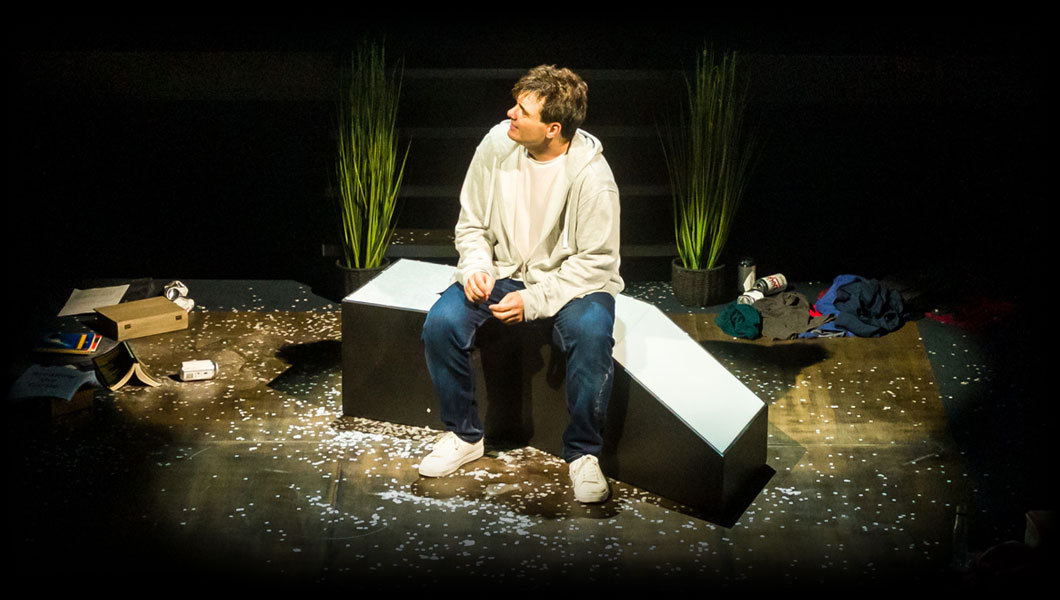
CITY HUB, SYDNEY
★ ★ ★ ★ ★
There are no dazzling sets or colourful costumes in Breaking The Castle. No orchestrated music, large ensemble cast nor a Broadway spectacular high budget price tag. However, this one-man production may be the most significant theatre production that audiences are ever likely to experience.
This is the brutally honest account of one man’s dependence and abuse of illicit drugs and alcohol. David is in his 30s and will try anything unorthodox to escape reality. Death doesn’t scare him – in his mind it could very well be the better alternative than fighting his inner demons every waking moment.
But what leads a good-looking young man to such low depths? Is living life to the fullest not the only option? Hope for new beginnings and redemption are at hand but can he rediscover himself when offered a chance at redemption in a rehabilitation clinic in South-East Asia?
All the events that may have led to this man’s downfall from childhood onwards are explored. A death in the family, a loveless upbringing and child abuse – could these and other issues be the reason why he cannot connect to life? Is he simply a starry eyed out of work actor misunderstood and blamed by society for his own misfortunes and torturous downward slide?
This incredibly riveting and affective theatre serves as a cautionary tale. It takes a long hard look at this man in question and inspires hope and the possibility of a long-term recovery.
Gritty, heartfelt, and funny at times, Breaking The Castle is written by Peter Cook who also delivers a hauntingly realistic performance as David. The comedic elements are mandatory and a welcomed relief from the morbid themes and the explosion of emotions that intermittently erupt on stage.
This is an excellent theatre going experience for all mature audiences and should be seen by older impressionable school children who could be at risk of experimenting with illicit substances.
